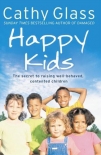Happy Kids, Cathy Glass [best ebook reader for ubuntu .TXT] 📗

- Author: Cathy Glass
Book online «Happy Kids, Cathy Glass [best ebook reader for ubuntu .TXT] 📗». Author Cathy Glass
Showing ‘attitude’ distances the teen from the norm – what they have so far conformed to and what you hold dear – and therefore contains the component of rejection that can be infuriating to parents; ‘I don’t like your attitude’ can be heard on the lips of many parents with children of this age. Remember that it is normal for a child of this age to develop ‘attitude’ as they search to redefine themselves. It will usually disappear in the later teenage years; and as long as the child doesn’t overstep the boundary into rudeness, it can be ignored. However, if their attitude becomes rude or unacceptably confrontational, then the young teen should be corrected.
You have Requested that Claire do the dishes, but she is clearly not happy about this; she is in a strop, huffing and puffing, and banging the china together. You Repeat,‘I’m sorry, Claire, but your attitude isn’t helpful. I’ve asked you to do the dishes and I’d be grateful if you could do it pleasantly.’Claire’s response probably won’t be,‘Yes, of course, Mummy dear,’although if it is, praise her. If her response is pointed silence (more likely), a moan, or‘Whatever,’as in the teenage ‘Ihear you but my defences are up’,or anything else that can be ignored, ignore it – don’t go looking for trouble. If her response is rude or disrespectful, deal with it, Reaffirm –‘Claire, I’m not having you speak to me like that, and I’ll be stopping the breakages out of your allowance.’When Claire has finished doing the dishes, even if it hasn’t been done graciously, thank her all the same. At this age seize on anything positive to praise, particularly if Claire or Tom is going through a very difficult period, where there isn’t much to praise.
Bad language
Your young teen’s speech and language skills will probably change and very likely take a turn for the worse. New, fashionable words like ‘cool,’ ‘wicked’ and ‘sad’ appear regularly in the vocabulary, and as quickly disappear. These ‘in’ words do not have the same meaning that adults attribute to them, and are updated regularly. By the time this book goes to press ‘cool’ and ‘wicked’ will doubtless have disappeared and anyone using them will be seen as very ‘sad’. Claiming such words as their own is part of teenage culture and while such words might be irritating to parents if they populate every sentence, they don’t do any harm.
Swearing is different and should be sanctioned. If certain expletives were unacceptable in your house when your child was little, then they are still unacceptable now your child is a teen. And obviously you can’t go around f—ing and blinding yourself and expect your teen not to.
Purposely dropping letters from words, such as ‘t’ from party, or mispronouncing words – ‘ain’t’ (haven’t), ‘gonna’ (going to) or ‘fink’/’fought’ (think/thought), in imitation of the in-vogue East-End London accent, is irritating but will not do any lasting damage. It’s surprising just how nicely teens can speak when they want to impress – listen to them talking to their grandparents or the parents of their friends. If your teen knows you like correct pronunciation, then corrupting language is an easy statement in their rebelling and redefining process. Ignore what you can and correct what you can’t.
Image
Appearance – i.e. clothes, hairstyles and make-up (mainly with girls) – makes another statement about how a pre-teen or early teen wants to be defined. Obviously, within certain perimeters, experimentation is essential, but clearly there needs to be boundaries – a blue Mohican hair cut on a fourteen-year-old boy is likely to get him into trouble at school, and wearing a hoodie will be interpreted by many adults to mean that he is a thug and mugger. Girls tend to need more advice and direction at this age than boys, as there is more potential for them to portray an image that sends the wrong message, resulting in unwelcome attention. By the age of thirteen most girls will have developed breasts and hips, and it is not in their best interest to flaunt them in public with a very low-cut or tightly fitting T-shirt, or too short a skirt. Don’t be afraid to stop your daughter wearing clothes that are inappropriate (i.e. overtly sexual) or too much make-up. Guidelines put in place now will stand your daughter in good stead for choices she will make about her appearance in the future. Boys at this age don’t have the same worry of inappropriately flaunting their sexuality (apart from low-crutch jeans), and with many boys’ mothers buying their clothes well into their teens they are less likely to be faced with the same decisions.
Unwelcome habits
Your pre-teen or early teen is likely to develop many unwelcome habits – slouching against things, chewing gum, feet on the coffee table, nail clippings in the bath, music too loud, laundry dropped on the floor, muddy footprints in the hall, etc. – which, although not a huge problem individually, can cause irritation in the parent that builds up and explodes into a scene. Address what is unacceptable to you and your house rules, and ignore what you can live with. You can’t tackle all your teen’s bad habits; otherwise you will be seen as continually nagging, resulting in you feeling grumpy and your young teen ignoring all





Comments (0)